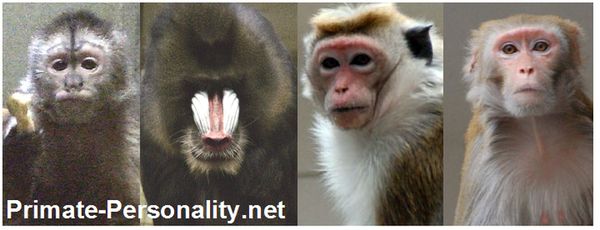Science Blog, Press Releases and Communiqués de Presse
Further posts and press releases: overview
Cross-species comparison of "personality" differences: A novel methodology to unravel communalities and differences
"Personality" differences have already been demonstrated in the behaviour of many species. But how similar or distinct are the "personality" differences described for different species? In her new study, Jana Uher introduces a comprehensive research methodology for systematic cross-species comparisons. Their application in four monkey species from four different continents reveals many commonalities but also exiting species differences.

(© Photos: Dr Jana Uher, primate-personality.net. London School of Economics & Free University Berlin)
For a long time, "personality" was thought to be one of the last domains of human uniqueness that would differentiate humans fundamentally from other animals. Meanwhile, however, individual differences that occur in similar ways repeatedly over time-commonly called "personality" differences-were shown in many species' behaviours.
In her recent research, Jana Uher has adapted and refined approaches and methods of cross-cultural "personality" psychology to develop a comprehensive methodology for systematic comparisons of "personality" differences across species. She demonstrates the application of this methodology in a study on four monkey species that are endemic to three different continents: Weeper capuchins originate from South America, Mandrills from Africa, and toque macaques and rhesus macaques from Asia. Over several weeks, her team observed monkeys housed at the Berlin Zoo and the Animal Shelter of Berlin, Germany, and recorded their individual behaviours meticulously-each individual for in total 60 to 80 hours.
The findings are fascinating. In all four species, individuals differ in their degrees of social orientation; thus, some individuals spent more time with group members and grooming than did other individuals. These individual differences were not just random but occurred in similar ways and repeatedly over time; that is, they reflect "personality" differences. In all four species, stable individual differences also occurred in aggressiveness and dominance. Thus, these individual differences can be considered as universal for these four primate species.
This universality allowed for making direct comparisons in the degrees to which individuals of the different species showed particular behaviours. These comparisons yielded interesting species-differences. Capuchin individuals generally spent much less time with their group than did the individuals of the other three species. But interestingly, the four species did not differ in the average frequencies by which their individuals showed aggressive behaviours.
The same was true for dominance behaviours. But in dominance, pronounced species differences occurred in the magnitude of the individual differences. The differences between individuals were most pronounced in the mandrills: some males and some females showed dominant behaviours very often whereas other individuals hardly ever did and showed a lot of subordination behaviours instead. This reflects the well-known finding that, in species with a despotic social system like Mandrills, the social hierarchy is much steeper than in species with a more egalitarian social system, such as capuchin monkeys.
Such differences in the magnitude of individual differences may have an important impact on the dynamics of social groups that could also influence speciation. The new research methodologies are therefore important tools for comparing "personality" differences in the entire behavioural repertoire systematically between species.
This research is part of a project funded by the German Research Foundation (DFG, UH249/1-1).
Scientific publication:
Uher, J. (2015e). Comparing individuals within and across situations, groups and species: Metatheoretical and methodological foundations demonstrated in primate behaviour. In D. Emmans & A. Laihinen (Eds.). Comparative neuropsychology and brain imaging (Vol. 2), Series Neuropsychology: An interdisciplinary approach. (chapter 14, pp. 223-284). Berlin: Lit Verlag. ISBN 978-3-643-90653-3 [Download] [GoogleBooks]
Last update: 18.09.2015
Keywords: Weeper capuchin (Cebus olivaceus), Mandrill (Mandrillus sphinx), Toque macaque (Macaca sinica), Rhesus monkey (Macaca mulatta), macaques, personality, rating, judgement, personality questionnaire, individual differences, species differences, species comparisons, personality dimensions, personality traits, individual behaviour, individual-specific behaviour, individual behavior, despotic, egalitarian, dominance hierarchy, aggressiveness, social behavior, social orientation.